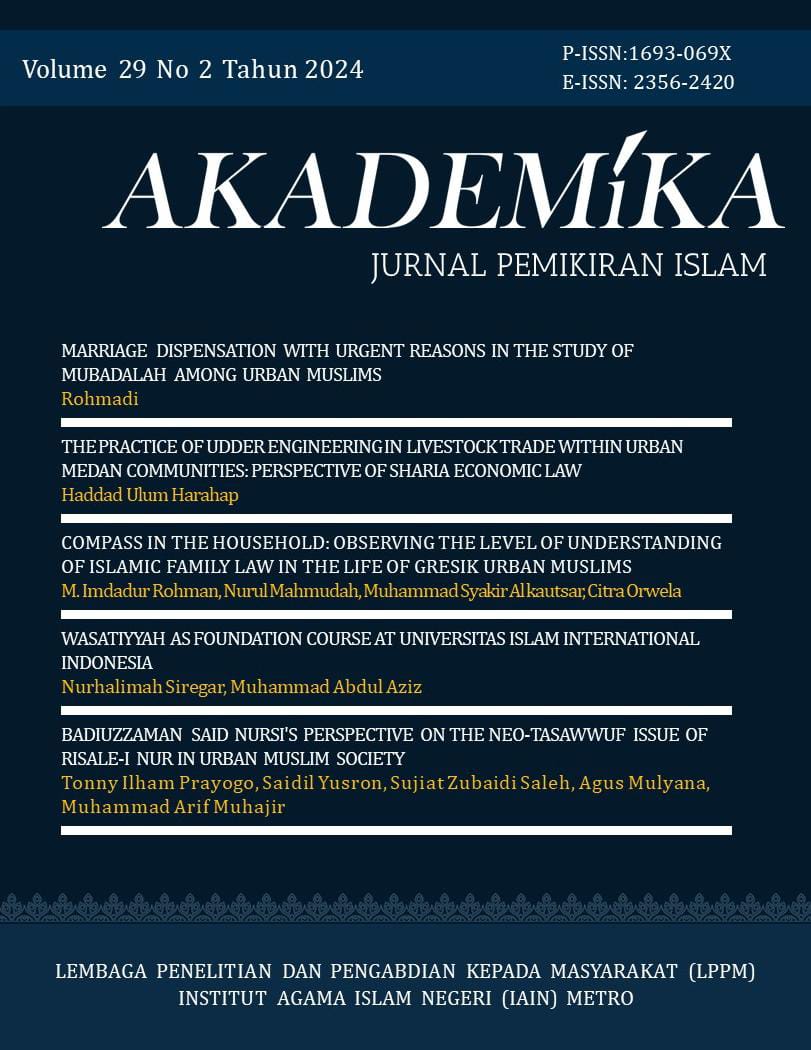SOCIAL MEDIA AND RELIGIOUSITY: SHIFTING THE LIFESTYLE PARADIGM OF URBAN MUSLIM STUDENTS
DOI:
https://doi.org/10.32332/akademika.v29i2.9181Keywords:
Lifestyle paradigm; social media; Urban Muslim students.Abstract
The increasingly massive development of social media presents various spectacles that can be consumed by the general public. Along with the rise of social media, many things have changed, one of which is religion. This requires that da'wah in the digital era needs to make modifications and make peace with the growing media. The increasingly massive use of social media allows it to have a positive or negative impact on a person. The purpose of this study was to determine the contribution of accessing the use of social media to religious attitudes in students. The method used is quantitative with a correlational type. Data collection techniques through questionnaires and documentation. The data analysis technique uses the product moment formula, and the coefficient of determination uses SPSS 18. The results of this study indicate that there is a positive contribution between activities in using social media and students' religious attitudes with a high category or equal to 0.684. Therefore, the higher the activity using social media, the more religious attitudes will increase. The next thing that needs to be considered is a wise attitude in using social media and filtering content that is contrary to religious norms. Social media usage activities will provide important contributions and follow relevant theoretical insights to examine the impact of Internet use on religious affiliation, behavior, and beliefs.
Downloads
References
Anthony, G. (1986). Kapitalisme dan Teori Sosial Modern. UI Press.
Arifin. (2011). Psikologi Dakwah Suatu Pengantar Studi. Bumi Aksara.
Audiana, M. (2020). Pengamalan Keagamaan Dan Sikap Religius Mahasiswa Pendidikan Agama Islam Institut Agama Islam Negeri (IAIN) Salatiga Tahun 2019/2020. IAIN Salatiga.
Azwar, S. (2011). Sikap Manusia Teori dan Pengukurannya. Pustaka Pelajar.
Campbell, D. E., & Putnam, R. D. (2012). American grace: How religion divides and unites us. Simon & Schuster.
Juditha, C. (2011). Hubungan Pengguna SItus Jejaring Sosial Facebook terhadap Perilaku Remaja di Kota Makassar. Jurnal Penelitian IPTEK-KOM, 13(Juni), 2–3.
Karim, A. (2016). Dakwah Melalui Media: Sebuah Tantangan Dan Peluang. At-Tabsyir, 4(1,Juni), 157–172. https://journal.iainkudus.ac.id/index.php/komunikasi/article/view/2911.
Khairuni, N. (2016). Dampak Positif Dan Negatif Sosial Media Terhadap Pendidikan Akhlak Anak (Studi Kasus di SMP Negeri 2 Kelas VIII Banda Aceh). Jurnal Edukasi: Jurnal Bimbingan Konseling, 2(1), 91. https://doi.org/10.22373/je.v2i1.693.
Lestari, D. (2018). Pengaruh Akun Instagram @Hijaberscommunityofficial Terhadap Pengetahuan Syiar Islam Dan Fashion Hijab Pada Followers Muslimah. Jom Fisip, 5.
Lim, C., MacGregor, C. A., & D.Putnam, R. (2010). Secular and Liminal: Discovering Heterogeneity Among Religius Nones. Journal for the Scientific Study of Religion, 49(4), 596–618. https://doi.org/10.1111/j.1468-5906.2010.01533.x.
McClure, P. K. (2017). Tinkering with Technology and Religion in the Digital Age: The Effects of Internet Use on Religious Belief, Behavior, and Belonging. Journal for the Scientific Study of Religion, 00(00), 1–17. https://doi.org/10.1111/jssr.12365.
Nasrullah, R. (2015). Media Sosial Perspektif Komunikasi, Budaya, dan Socioteknologi. Simbiosa Rekatama Media.
Ostic, D., Qalati, S. A., Barbosa, B., Shah, S. M. M., Galvan Vela, E., Herzallah, A. M., & Liu, F. (2021). Effects of Social Media Use on Psychological Well-Being: A Mediated Model. Frontiers in Psychology, 12. https://doi.org/10.3389/fpsyg.2021.678766.
Priyatno, D. (2016). Belajar Alat Analisis Data Dan Cara Pengolahannya Dengan SPSS: Praktis dan Mudah Dipahami Untuk Tingkat Pemula dan Menengah. Gava Media.
Putnam, R. D. (1995). Tuning in, tuning out: The strange disappearance of social capital in America. PS: Political Science and Politics, 28(4), 664–683. https://doi.org/10.2307/420517.
Stark, R. (2008). What Americans Really Believe. Baylor University Press.
Stolow, J., & Meyer, B. (2021). Enlightening religion: Light and darkness in religious knowledge and knowledge about religion. Critical Research on Religion, 9(2), 119–125. https://doi.org/10.1177/20503032211015276.
Sugiyono. (2014). Metode Penelitian Kuantitatif Kualitatif Dan R & D. Alfabeta.
Sule, M. M. (2018). Social Media And Its Effects On Muslim Students: The Case Of Nasarawa State University, Keffi, Nigeria. UMRAN - International Journal of Islamic and Civilizational Studies, 5(2), 30–44. https://doi.org/10.11113/umran2018.5n2.201.
Sule, M. M. (2020). Social media utilization in Covid-19 epoch: Virtual da’wah-ramadan lectures in Northern Nigeria. Jurnal Ilmu Dakwah, 40(2), 128. https://doi.org/10.21580/jid.v40.2.5809.
Surawan. (2020). Psikologi Perkembangan Agama: Sebuah Tahapan Perkembangan Agama Manusia. K-Media.
Suryabrata. (2011). Metodologi Penelitian. Rake Sarasin.
Swandar, R. (2017). Implementasi Pendidikan Karakter Religius di SD Budi Mulia Dua Sedayu Bantul. Laporan Penelitian, Yogyakarta: PGSD, Universitas PGRI Yogyakarta.
Triastuti, E., Andrianto, D., & Nurul, A. (2017). Kajian Dampak Penggunaan Media Sosial Bagi Anak Dan Remaja. In Puskakom.
Verschoor-Kirss, A. (2012). Even Satan gets likes on Facebook: the dynamic interplay of religion and technology in online social networks. 14, 1–12.
Windari, R. (2020). Pengaruh Penggunaan Media sosial Terhadap Pemahaman Keislaman Mahasiswa Prodi PAI Di IAIN Purwokerto. IAIN Purwokerto.
Windarwati, H. D. (2020). Penghayatan Merupakan Parameter Tertinggi Intensitas Penggunaan Media Sosial Pada Remaja SMA. Jurnal Keperawatan Jiwa, Vol 8 No 3.
Zaluchu, S. E. (2024). Digital Religion, Modern Society and the Construction of Digital Theology. Transformation, 0(0). https://doi.org/10.1177/02653788231223929.
Zarkhasyi, K. (2015). Orangtua Sahabat Anak dan Remaja. Cerdas Pustaka.
Zulaiha, siti dkk. (2019). Edukasi Literasi Informasi Bagi Anak dan Remaja Untuk Meminimalisir Penyalahgunaan Media Jejaring Sosial. Jurnal Harkat: Media Komunikasi Gender, 15(2). 10.15408/harkat.v15i2.13469.
Downloads
Published
Issue
Section
License
Copyright (c) 2024 Khairil Anwar, Surawan Surawan, Sarimah Awang

This work is licensed under a Creative Commons Attribution-ShareAlike 4.0 International License.







